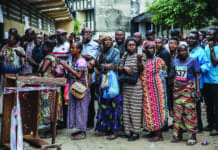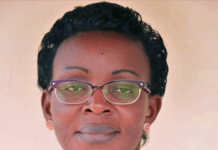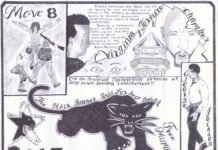by Mary Ratcliff

July 27 update: “The U.K. and the Netherlands have joined the U.S. in withholding aid to Rwanda over its alleged backing of rebels in Democratic Republic of Congo,” reports the BBC – $25 million and $6.2 million respectively.
For now, only $200,000 for a military training academy has been cut. But considering how staunch an ally the U.S. has been to Rwanda, the Post calls it a “clear snub.” Rwanda was sub-Saharan Africa’s fifth largest per capita U.S. aid recipient in 2011.
“The United States government is deeply concerned about the evidence that Rwanda is implicated in the provision of support to Congolese rebel groups, including M23,” read the announcement. Rwanda denies the charge.
The statement published below, issued June 28 by the Great Lakes of Africa Coalition, is part of a three-year campaign by advocates for peace in the Congo and an end to the plundering of its mineral riches that culminates successfully in today’s announcement. The campaign, urging implementation of the only law sponsored by President Obama during his term in the U.S. Senate, has been chronicled by the Bay View, beginning with a Jan. 17, 2009, story headlined “On the 48th anniversary of the assassination of Patrice Emery Lumumba” by Ann Garrison.
“On Saturday, Jan. 17, Congolese immigrants, students and supporters rallied around the world to Save Congo! – the Democratic Republic of the Congo, formerly Zaire, now otherwise known as Congo-Kinshasa. The Congolese people continue to suffer staggering casualties in the ongoing African holocaust, otherwise known as the African World War, which has cost between 5 and 6 million Congolese lives since 1996, and which continues to cost 45,000 lives a month,” the story begins.
Published three days before Obama was sworn in as president, the story cited the U.S. law that, if implemented, could end the genocidal war: “In 2006, Barack Obama won passage of the Congo Relief, Security and Democracy Promotion Act of 2006,” Garrison wrote. However, she added, “he has not given any indication that he will break with Clinton-Bush policy in Congo and neighboring Rwanda.”
In “Obama’s Congo moment: Genocide, the U.N. report and Senate Bill 2125,” published Oct. 1, 2010, Garrison further examined Obama’s one and only law and the good he could do “by withdrawing the military support, weapons, training, logistics and intelligence for Kagame. … If he did so, peace and human rights activists all over the world would stand behind him and the narrative revision that he quietly penned three years ago.”
The Great Lakes of Africa Coalition in its most recent statement below lays out Obama’s choice: “With a law on the books requiring that the United States respond as Sweden and the Netherlands did (by withholding aid) – and as the second biggest donor to Rwanda, providing nearly $200 million in aid annually – the U.S. has the power to help stabilize the region or continue to underwrite those who are destabilizing it. In its position, the U.S. has both tremendous leverage and responsibility to take action.”
The Bay View salutes the advocates for today’s victory and looks to such young but accomplished leaders as Congolese Kambale Musavuli of Friends of the Congo and Rwandan Claude Gatebuke of the African Great Lakes Action Network for continued success in their campaign.
Great Lakes of Africa Coalition calls for U.S. action to end instability in the Democratic Republic of Congo
Signatories: Institute for Policy Studies, Foreign Policy in Focus; Africa Faith and Justice Network; Africa Action; African Great Lakes Action Network; Mobilization for Justice and Peace; Shalupe Foundation; Friends of the Congo

Reuters states that “the (UN) experts have implicated several high-ranking Rwandan officials who are directly involved.” The U.N. material has been “verified by five separate sources,” identifying Rwandan “officials supporting M23 as Defense Minister James Kaberebe, Chief of Defense Staff Charles Kayonga and Gen. Jacques Nziza, a military adviser to Kagame.”
Kaberebe, according to this source, was “in constant contact with M23.” In spite of the abundance of evidence demonstrating Rwanda’s support of war criminals in the Congo, Secretary of State Hillary Clinton and the U.S. State Department refuse to hold Rwanda to account in spite of a U.S. law that calls for withholding of aid to countries that destabilize the Congo.

Worth noting are previous rebellions of the Alliance of Democratic Forces for the Liberation of Congo-Zaire (AFDL) in 1996, the Rally for Congolese Democracy (RCD) in 1998 and the National Congress for the Defense of the People (CNDP) in 2006. It is telling that former members of the RCD like renegade Gen. Laurent Nkunda formed the CNDP and that, today, former members of the CNDP and RCD, including indicted war criminal Bosco Ntaganda, are members of the M23 rebellion.
These rebellions are not separate, internal rebellions as they are often reported, but are all related recurrences of foreign intervention by the Rwandan government.
According to the United Nations High Commissioner for Human Rights Navy Pillay, “The leaders of the M23 figure among the worst perpetrators of human rights violations in the DRC, or in the world for that matter, and many of them have appalling track records, including allegations of involvement in mass rape and of responsibility for massacres and for the recruitment and use of children.“

This legislation has been on the books for six years but has yet to be fully implemented. The recent flood of evidence pointing to Rwanda’s military aggression in the Congo calls for enforcement of this law.
In the United Kingdom, more than 20 members of parliament have joined the call to suspend financial support to Rwanda in light of the content in the U.N. report implicating Rwanda in supporting rebels in the Congo. In accordance with its own statute, the U.S. government should withhold any military bilateral and multilateral budgetary aid until Rwanda permanently ceases its support of rebels in the DRC.
Given the Obama administration’s mass atrocities prevention directive, current violence in the Kivu provinces of the DRC, which share a border with Rwanda, tests the U.S. government’s political will to fulfill its promises and enforce its laws. Will the administration recognize the atrocities in eastern DRC and use the law Obama wrote to hold destabilizing parties responsible?
Historically, economic sanctions have proven effective in curtailing Rwandan aggressions across the border. In late 2008, Sweden and the Netherlands suspended aid to Rwanda after evidence surfaced showing Rwanda’s support of the CNDP rebel group.
The CNDP rebellion, parent to the M23 rebellion currently led by the International Criminal Court (ICC)-indicted war criminal Bosco “The Terminator” Ntaganda, had been devastating eastern Congo, causing thousands of deaths and displacing over 300,000 people from their homes. As soon as aid was withdrawn, Rwanda arrested Gen. Laurent Nkunda.

The international community failed Rwanda in 1994 when it did little to respond and help prevent genocide, and nearly a million Rwandans were slaughtered within three months. Aftershocks from that tragedy have been reverberating through the region ever since.
Though Rwanda has stabilized significantly, it is still a time to respond to mass atrocity in the region, as more than 6 million civilians have perished in Congo since 1996, Rwanda’s first documented invasion. The United States government must do its best to foster peace and reconciliation in the whole region, not just in Rwanda.
This means not merely giving aid but doing due diligence. The best hope for a speedy end to the atrocities is for donor nations to begin withholding aid from governments who perpetrate instability in the region.
Please join the Great Lakes of Africa Coalition in urging the U.S. government to take swift and decisive action in Congo. Call on Secretary of State Hillary Rodham Clinton to help end the impunity in the Congo by enforcing Section 105 of Public Law 109-456. Sign the petition at http://www.change.org/petitions/secretary-of-state-hillary-clinton-help-end-the-conflict-in-the-congo.
The Great Lakes of Africa Coalition can be reached through Claude Gatebuke of the African Great Lakes Action Network at cgatebuke@gmail.com. Bay View editor Mary Ratcliff can be reached at editor@sfbayviewnews.wpenginepowered.com or (415) 671-0789.

 Store
Store












